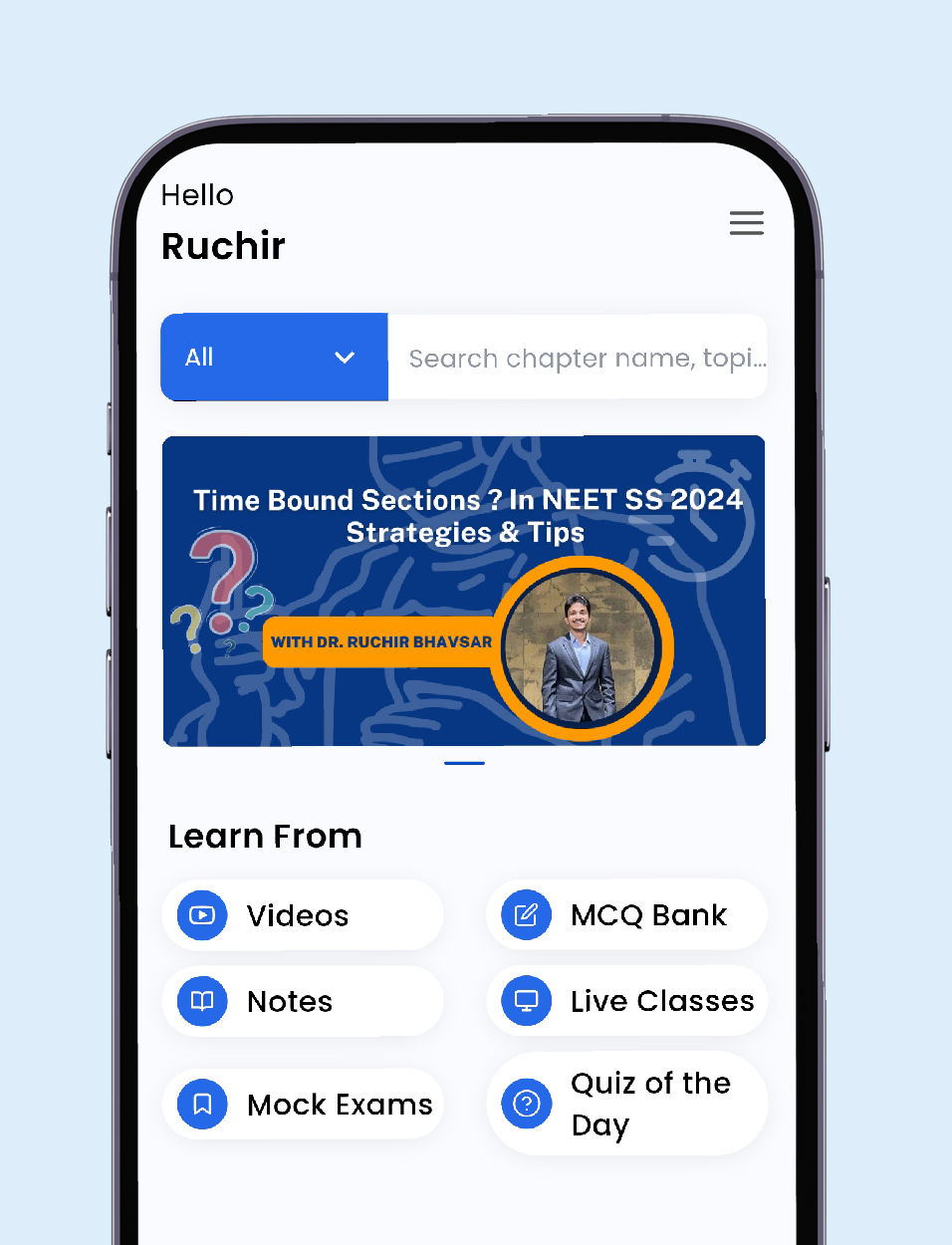By: Dr. Ruchir Bhavsar
Preparing for the NEET SS exam can be an overwhelming experience, filled with uncertainty, self-doubt, and anxiety. Whether you’ve been preparing for months or have just begun, it’s natural to feel a sense of pressure as the exam date approaches. However, the key to success lies in focused preparation, smart revision, and a strategic approach to mock exams.
In this session, we will address common concerns regarding revision strategies, efficient study techniques for the last two months, mock exam analysis, and tackling high-yield topics. The goal is to help you optimize your preparation so that you can maximize your score with confidence.
1. Managing Exam Anxiety and Setting the Right Mindset
The biggest mistake many aspirants make is overthinking about the outcome rather than focusing on the process. You may wonder:
- What if I don’t score well?
- Will I be able to finish my syllabus?
- Will my preparation be enough?
Instead of worrying about what will happen on exam day, shift your mindset to what you can control today. Your focus should be on mastering the material and ensuring that you answer questions to the best of your ability.
Some key pointers to keep in mind:
✅ Do not worry about when the exam will be held. Follow the tentative exam schedule and prepare as if the exam is happening on that date. If there are any changes, you will have extra time to revise.
✅ Set daily study targets and ensure that your preparation is goal-oriented rather than just passively reading.
✅ The aim should be 100% effort, not a specific rank. Focus on covering and retaining concepts rather than stressing over rank predictions.
2. Time Management and Smart Study Strategies for the Last Two Months
With limited time left before the exam, it is crucial to prioritize your study materials efficiently. Here’s how you can maximize your preparation:
A. Structured Approach to Revision
Instead of one-time exhaustive revision, use spaced repetition techniques. Studies show that frequent, shorter revisions over a period of time help in long-term retention compared to cramming large portions in one go.
🔹 Revise important topics every 3-5 days instead of waiting for the last few weeks.
🔹 Use flashcards, notes, and summary sheets to reinforce concepts.
🔹 Spend time revising only marked or highlighted portions from textbooks instead of reading entire chapters again.
B. Prioritizing High-Yield Topics
Many students ask: Which are the most important topics for NEET SS? The reality is that NEET SS does not follow a predictable pattern, and questions can come from any topic. However, some broad trends can help:
✔ Rare question repetition: Unlike other exams, NEET SS rarely repeats questions. You cannot rely on previous year’s questions for scoring high.
✔ Coverage of multiple subjects: There are no fixed “important topics.” Instead, every topic holds the potential for questions.
✔ Systematic textbook coverage: If a subject like orthopedics hasn’t been asked in recent years, you can deprioritize it, but for other subjects, assume everything is fair game.
3. Mock Exams: The Key to Success
Mock exams play a crucial role in preparation, not just for testing knowledge but also for improving time management and accuracy. Many students make the mistake of taking mock tests but not analyzing them properly. Here’s how you should approach them:
A. Analyzing Your Mock Test Performance
When reviewing a mock test, focus on:
🔹 Incorrect questions – Understand why you got them wrong. Was it a conceptual mistake, a silly error, or confusion between two options?
🔹 Bookmarked questions – Identify frequently mistaken topics and revise them thoroughly.
🔹 Time allocation – Monitor how much time you spend per question. Aim for 45 seconds per question to complete the exam efficiently.
B. Optimizing MCQ Practice in the Final Phase
There are two types of students at this stage:
1️⃣ Those who have been preparing for 4-6 months – If you’ve already completed most of your syllabus, focus on:
✔ Reviewing bookmarked questions from your MCQ bank.
✔ Practicing previously incorrect questions to reinforce weak areas.
✔ Revisiting key explanations rather than solving new MCQs.
2️⃣ Those who started preparing recently – If you are starting late, the smartest strategy is to:
✔ Prioritize solving MCQs textbook-wise rather than attempting random tests.
✔ Read explanations alongside MCQs for faster comprehension.
✔ Avoid starting new books; instead, consolidate material from one or two standard sources.
4. Efficient Note-Making for Quick Revision
One of the biggest challenges students face is forgetting what they studied. A simple yet effective technique is to make concise notes from MCQs where you make mistakes.
How to Create Effective Summary Notes?
📝 Do NOT write detailed explanations. Instead, write one-liners for questions you got wrong.
📝 Highlight key facts and mnemonics that you tend to forget.
📝 Use a dedicated notebook or digital notes for topics where you consistently make mistakes.
📝 Revisit your mistake notes daily for 5-10 minutes to reinforce memory.
💡 Example: If you keep forgetting the types of hydrocephalus in neurosurgery, instead of re-reading the entire chapter, simply write:
- Hydrocephalus Types:
- Communicating – Impaired absorption
- Non-communicating – Obstructed CSF flow
By revising this one-minute summary daily, your recall will improve significantly.
5. How to Approach Textbook Revision
Should you re-read textbooks in the last two months? The answer depends on your stage of preparation.
✅ For those who have already read textbooks:
✔ Stick to your notes and marked sections instead of re-reading everything.
✔ Use rapid revision notes or summarized versions instead of full textbooks.
✔ Skim through high-yield tables, flowcharts, and images to retain key concepts quickly.
🚫 For those starting now:
✔ Do NOT attempt to read entire textbooks at this stage.
✔ Instead, prioritize solving MCQs and reading explanations alongside.
✔ Stick to one standard textbook rather than juggling multiple sources.
6. Improving Recall with Smart Revision Techniques
Many students struggle with recalling information even after multiple readings. The best way to improve recall is through:
🔹 Interleaved revision – Instead of reading one topic at a time, mix multiple topics in a day.
🔹 Morning reviews – Spend the first 30 minutes revising previously learned material.
🔹 Rapid recaps – Quickly scan your short notes or mistake notebook at the end of each day.
By revisiting information repeatedly, your brain converts it into long-term memory, reducing last-minute stress.
7. Advanced Revision Techniques: Optimizing Your Recall
One of the most common challenges faced by aspirants is retaining information effectively. Many students spend hours reading but struggle with recalling key concepts under exam pressure. Here’s how to enhance memory retention through smart recall strategies:
A. The Power of Small, Frequent Revisions
Instead of revising an entire topic at once, break your revision into small chunks. This is where spaced repetition and frequent recall play a crucial role.
🔹 How to apply this?
- If you studied Graves’ disease today, quickly revise thyroiditis tomorrow and thyroid cancers the day after.
- Keep a dedicated time slot for rapid revision – just scroll through your notes, summaries, or bookmarked questions during breaks.
- This method tricks your brain into effortless learning, and even though it may not feel like active memorization, it significantly improves recall under exam stress.
💡 Key Tip:
During moments of boredom or study fatigue, instead of passively scrolling through social media, glance through your revision notes or summary sheets. This simple habit reinforces memory without overwhelming you.
8. Smart Time Allocation: Balancing MCQs and Theory
A common dilemma among aspirants is how much time to dedicate to MCQs vs. theory. The ideal split at this stage is:
✅ MCQ Solving: 60-70% of study time
✅ Theory Revision: 30-40% of study time
Why Prioritize MCQs?
🔹 When solving MCQs, you cover 80-90% of textbook content in an exam-oriented manner.
🔹 Practicing MCQs helps you anticipate question patterns and learn how topics are framed in exams.
🔹 Theory revision should now be limited to marked sections, self-made notes, or rapid revision summaries – avoid fresh reading!
💡 Example:
If you’re revising liver topics, first solve MCQs from daily practice tests. As you review explanations, you automatically revise the important theory concepts in a concise manner.
Who Needs This Approach?
📌 Long-term Preparers (6+ months of study) → Focus more on revising MCQs and solving incorrect/bookmarked questions rather than re-reading theory.
📌 Recent Starters (3-4 months of study) → Solve MCQs in practice mode while simultaneously revising from rapid notes.
🚨 Warning:
❌ Do NOT start new textbooks or fresh topics in the last two months unless you are sure you can revise them at least once before the exam.
❌ Last-minute new material can overload your brain and lead to confusion rather than clarity.
9. Setting Realistic Revision Goals
Many aspirants underestimate the power of multiple revisions. The truth is, you should aim to revise at least 2-3 times before the exam.
🔹 Why multiple revisions?
- 70% of the MCQs in NEET SS will be from topics you have already studied.
- The remaining 30% may be unpredictable, but your goal should be to maximize accuracy in familiar topics.
How to Ensure Effective Revision?
✔ Daily Revision: Spend 10-15 minutes revisiting tricky topics or challenging MCQs.
✔ Topic Mixing: Instead of revising one subject at a time, mix multiple short topics to enhance recall speed.
✔ Accelerated Last-Week Review: By the final week, you should be able to skim through notes quickly and recognize key concepts instantly.
💡 Example:
If you study Endocrine Surgery today, tomorrow revise a few high-yield facts from Neurosurgery or Plastic Surgery. By repeating this, you train your brain to recall cross-specialty information faster.
10. The Importance of Mock Exams: Fine-Tuning Your Strategy
Mock exams are the single most important tool to test your preparation and improve exam temperament.
A. Why Are Mock Exams Crucial?
📌 They simulate the real exam scenario, helping you practice time management.
📌 They highlight weak areas, allowing you to identify topics that need further revision.
📌 They help train your mind to focus between 2-5 PM, the actual exam timing.
B. How to Analyze Your Mock Performance
Many students focus only on their scores, but proper analysis is much more important:
1️⃣ Identify Incorrect Answers – Understand if mistakes were due to:
- Lack of knowledge? (Revise that topic)
- Silly errors? (Improve focus and question interpretation)
- Misconceptions? (Re-learn concepts properly)
2️⃣ Evaluate Time Spent Per Question – Your target should be 45 seconds per question to complete all 150 questions in 150 minutes.
3️⃣ Monitor Your Strong & Weak Subjects – Use mock tests to identify weaker areas and allocate more revision time to those.
💡 Key Tip:
- If you’re consistently scoring well in certain topics, prioritize revision of weaker topics instead.
- Do NOT over-attempt mock exams without analysis – the goal is quality over quantity.
11. Training Your Mind for Exam Day
The psychological aspect of the exam is just as important as knowledge. Many aspirants struggle with exam-day anxiety, time pressure, and mental fatigue. Here’s how to train yourself:
🔹 Practice solving MCQs during 2-5 PM – This ensures that your brain is most active and focused during the actual exam slot.
🔹 Avoid erratic study schedules – A structured routine reduces anxiety and builds confidence.
🔹 Simulate exam pressure – Solve full-length mock exams in one sitting under real-time conditions.
💡 Example:
If your NEET SS exam is scheduled from 2 PM – 5 PM, do NOT nap during this time in your daily routine. Instead, train your mind to be alert by solving MCQs at this time every day.
Final Words: The Road to Success in NEET SS
With just two months left for the NEET SS exam, now is the time to fine-tune your preparation and optimize your strategy. Here’s a quick recap:
✅ Prioritize MCQs (60-70% of study time) over theory (30-40%)
✅ Use spaced repetition for smarter recall
✅ Stick to already-studied material; avoid fresh topics
✅ Ensure multiple revisions (at least 2-3 times)
✅ Train your mind to focus during 2-5 PM through mock exams
✅ Analyze mock tests properly; focus on improving weak areas
Your journey to NEET SS success is a marathon, not a sprint. With focused efforts, smart revision strategies, and effective time management, you can maximize your score and secure your desired specialty.
🚀 Stay consistent, stay confident, and keep pushing forward! 🚀
Best of luck to all NEET SS aspirants! 🎯







